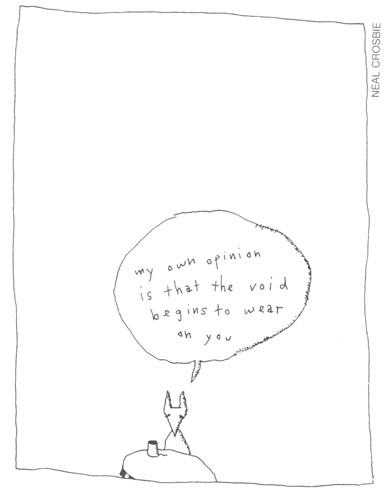Ken Jones
Jon Carpenter Publishing: Oxford, U. K., 1993.
212 pp., £9.99 (paper).
Beyond Optimism is good, albeit occasionally bitter, medicine for a species caught between two conflicting realities—total dependence on wealth created by unsustainable economic growth, and the deeper reality of a planet gradually withering under the impact of it. Ken Jones, a long-practicing Buddhist and Welsh social activist, presents a scorching analysis of the contemporary human predicament, and even more poignantly, the ideologies we most often turn to for solace from it. His eloquent manifesto for political, social, and spiritual transformation casts a critical eye on all the current sacred cows.
Proclamations of another New Age fill Jones with apprehension. He notes that the utopian dreams of high-minded and impassioned ideologues have often come to nothing, or worse, denigrated into new nightmares of oppression, poverty, and sheer human waste. Ideology itself, says Jones, is the “historic disablement—the collective expression of our individual blindness about who and what we are.”
While Ken Jones advocates a “radical green project”—one that would result in a broad human obsession with inner work and sweeping ideological disarmament—he just as quickly faults anyone lost in hopefulness or smitten by a romantically intoxicated over-idealization of one “ism” or another, whether it be tribalism, smallism, activism, optimism, conservatism, or even Buddhism (particularly with a capital B).
No one, including Arne Naess, Teddy Goldsmith, Matthew Fox, or even Fritz Schumacher, is safe from Jones’ uncompromisingly sharp eye and incisive critique. The book’s acknowledgments are a presage of the ideological slaughter to come when jones offers an apology for those “who may feel hurt by my wide-ranging critique of what I perceive as ideology in certain green and spiritual movements.”
Jones endeavors to make an important distinction, sometimes hard to recognize, between “ideology” and a “framework of thought,” the former existing more to confirm and legitimize those who hold it than to provide a reliable view of reality.
Buddhism, with its nontheistic and nondogmatic spirit of self-verification, is a spiritual tradition on which jones says he grounds his arguments. Applying the Buddhist social theory posited in his earlier work and in the work of Joanna Macy and others, he issues a passionate renunciation of ideology itself, convincingly tying it to the basic problem of craving to confirm the self, both to oneself and to others. He also embraces the activist spirit of Buddhism espoused and exemplified by Thich Nhat Hanh, Sulak Sivaraska, and Robert Aitken. In engaged Buddhism, the dharma cannot be understood apart from social and political realities.
Of exceptional clarity is the list of criteria, inspired by Buddhism and Gandhianism, for undertaking any movement of opposition to virtually anything. Jones quotes the late Petra Kelly’s wise words that “the greens must become a spiritual movement, not in any fixed religious sense, but in the sense of transforming certain values and conserving others, such as solidarity and tenderness.” He also calls for a feminization of the future, based on the recognition that women will not find liberation in a society whose fundamental model of relationships is one of domination.
Lambasting the currently fashionable belief that Green business, armed with new “clean” technologies, can make endless growth sustainable, he concludes that this delusion may be more a part of the problem than any answer. He suggests that those changes in lifestyle necessary to achieve true sustainability will require “much more than becoming a vegetarian cyclist who uses eco-friendly laundry soap” and more, even, than “adopting a lifestyle of simplicity, consuming less and making possessions last longer.” The urgency of this social revolution requires that everyone take an active role in both inner and outer work: to commit time and energy to build “a green transitional social culture”; to choose a livelihood of real positive value to people and the entire web of life, or at least do no harm; and to live one’s life in ways that “affirm interdependence and mutuality” with others.

As a solution, he proposes a dedevelopment program: reduction of consumption and the equitable redistribution of resources. What we need, pleads Jones, is for people to be simultaneously radical and realistic, practical and visionary. He sees the contemporary crop of bodhisattvas as “passionate moderates, radical conservatives, reasonable revolutionaries and temperate extremists.” In short, we need to become “possiblists,” accepting of fear without being possessed by it, patient and clear-sighted, and willing to live beyond both optimism and despair.
In spite of his abhorrence of ideologies, Jones predicts we have not heard the last of socialism, and for all his disdain of the “isms,” the reader will detect a soft Spot in Jones’ heart for Marxist social theory. At times, Jones just barely avoids shrillness and self-righteousness, but he solidly wins admiration for revealing the true colors of our ecological and spiritual malaise and stripping the Green movement of its ideology and romanticism. In spite of all the urgency, however, Jones cautions us not to hurry, recalling the wisdom of Zen master Kuei-shan, who observed that “great liberation is a pearl of rare price, but, nevertheless, when it first appears it is embedded in a pile of accumulated shit.”
Thank you for subscribing to Tricycle! As a nonprofit, we depend on readers like you to keep Buddhist teachings and practices widely available.